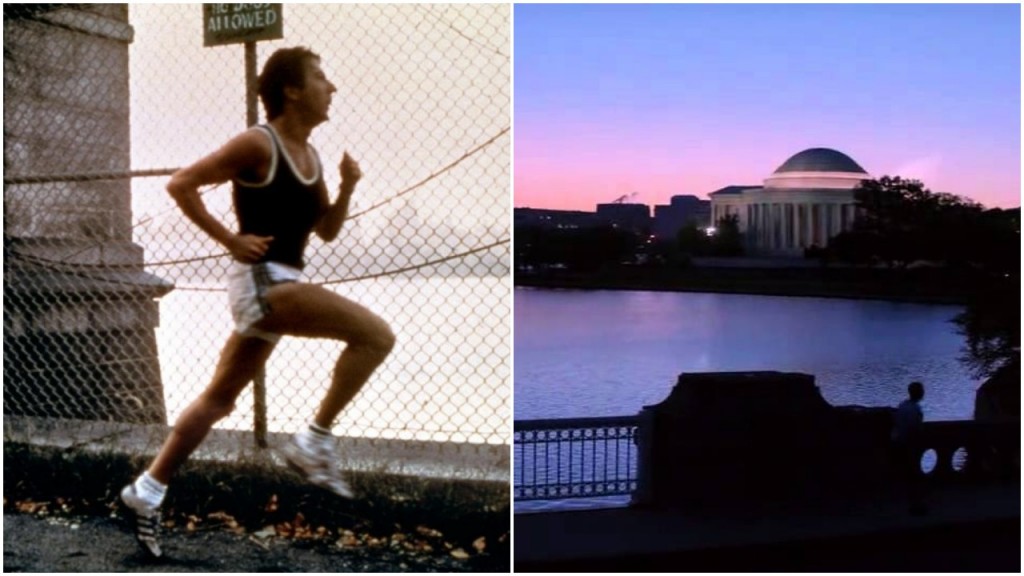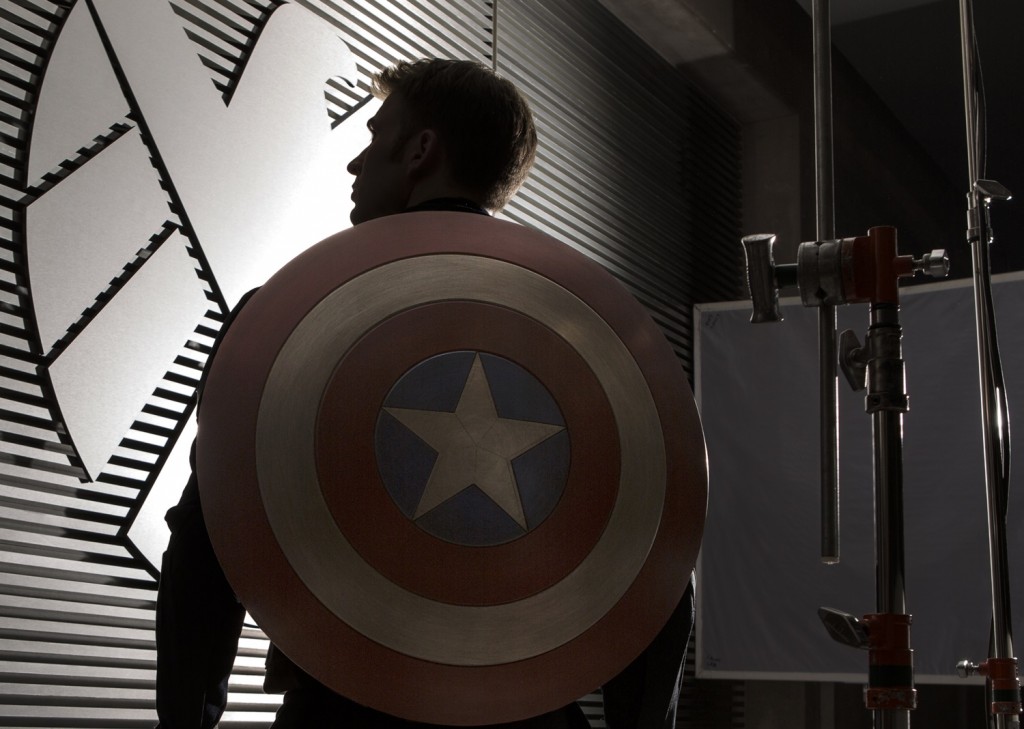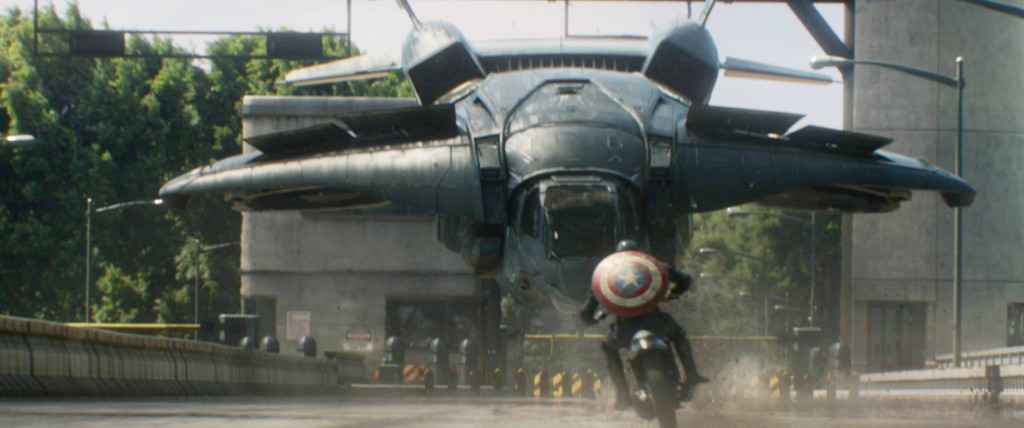When did you get tired of hearing Captain America: The Winter Soldier described as a political thriller?
It’s okay to say “never;” I haven’t gotten tired of it yet. However, despite sharing common themes and ideas with the ’70s political thriller, as well as borrowing the structure of the film from Three Days of the Condor (Joe and Anthony Russo call it out as a key influence in their excellent director’s commentary), it’s hard to reconcile the down-and-dirty films from Condor‘s era with the up-tempo bombast of a Marvel action movie. Condor climaxes with Joe Turner surviving a final encounter with the assassin that killed his colleagues only because The Powers That Be deemed it more convenient to suicide someone else at that moment. It ends with Joe eternally looking over his shoulder, unsure if anyone will ever care about the atrocities he exposed. Winter Soldier climaxes with Steve Rogers and Sam Wilson bringing down three murderous helicarriers before they can “correct” a million “problems” simultaneously, forever changing the status quo in the process and coming out relatively unscathed. You can see where there’d be a disconnect.
Let me make an obvious proposal: The Winter Soldier is a movie that lies between the extremes. It’s not really an American New Wave thriller, not quite a four-quadrant blockbuster. It uses the lessons of one to meet the demands of the other. What’s remarkable is that it seems like the two styles should clash, given that the rise of one led to the decline of the other. Instead, it gives the film a visceral, immediate charge. My question isn’t “How is The Winter Soldier a political thriller,” but rather, “Why did The Winter Soldier need to be a political thriller, even if only one of sorts?”
Let’s go back to the first time I ever heard the term “Winter Soldier:” it was the title of a 1972 documentary that functioned as a record of the Winter Soldier Investigation held between January 31 and February 2 of 1971 by Vietnam Veterans Against the War. It was started in the aftermath of the My Lai Massacre; what the country wanted to write off as an isolated incident, the VVAW wanted to show as part of a larger pattern surrounding the war. Unfortunately the immediate results of the Winter Soldier Investigation were mixed. It got some attention from Congress, but the project was barely acknowledged by the mainstream media, and the subsequent film failed to find distribution because of its disturbing content regarding an ongoing war. It ultimately bankrupted the VVAW.
The documentary lived on, however, providing a snapshot of the context in which the films which would inform The Winter Soldier flourished. In those days, American filmmakers had a deep, righteous distrust in our country’s direction, and they were encouraged to express it in ways that cut right to the truth of the matter and showed how scared and angry they were. So in using the name “Winter Soldier,” the film recalls a time in our collective American lives when we were dealing with an increasing awareness of, and disillusionment over, just how fucked our country was. This suits the story of Captain America: The Winter Soldier to a tee, and the Russo Brothers leaned into that.
A story is a story, though; it can change on the whims of any high-level production member. And what makes The Winter Soldier interesting as a movie is that its story chose to make an abrupt left turn from the pulpy adventure thrills of The First Avenger. That first film set the baseline and established the title character going forward. Steve Rogers volunteers for the super-soldier program because he’ll do anything, as a 90-pound weakling, to fight for his country. Not out of pride, but rather obligation; it’s his home, it’s being threatened by the Nazi regime, and he’s got no right to stay at home while his neighbors die.
In 1941, Steve Rogers is a believer. He goes into Arctic stasis because he’s sure his sacrifice would keep the world free. When he wakes up, his friends are dead, the badass love of his life is now a feeble old woman falling into the abyss of dementia, and he’s in a world where all the other believers like him got wrecked by the one-two punch of Vietnam and Watergate—punches he dodged by air-quote-unquote “virtue” of not being there to take them. The ideal heroes of our youth have turned from the American soldier who just wanted to make a difference to sarcastic private sector moguls like Tony Stark. In 2014, Steve Rogers is alone.
Cap’s isolation in modern society is further emphasized by the Russos’ love of shooting him in wide angles that dwarf him in the frame. In fact, his first appearance is in a wide shot: passing Sam Wilson on an early morning jog around the Potomac. This is how clever the Russos are: the shot itself is inspired by the opening of Marathon Man—placing the film’s influences directly on its sleeve from the jump. Far from an empty homage, however, it also quickly and casually establishes Cap’s powers by giving us a good look at him lapping Sam, while letting all that negative space in the foreground he inhabits imply just how little he has in this world. If you’re paying attention, The Winter Soldier can tell you what it’s about in an opening shot that lasts less than 20 seconds.

LEFT: Dustin Hoffman in Marathon Man (1976)
RIGHT: Anthony Mackie in Captain America: The Winter Soldier (2014)
So if Cap starts the movie on his own, then a natural arc would end with him learning who his friends were in this era, and a political thriller that’s heavily influenced by Three Days of the Condor ends up being a great fit. Because the heroes of such thrillers find themselves going up against an establishment with far-reaching power, they often start off on their own; it’s simply easier for others to believe that things aren’t as bad as our hero claims. This means that the allegiances a hero manages to forge on his journey mean all the more to him. Cap starts this movie distrustful of Nick Fury and Natasha Romanoff (despite being Avengers teammates). By the end of it, he finds some respect for Fury; he’s tight with Natasha; he’s forged a close kinship with Sam Wilson, who’s going to help him find his newly rediscovered best friend Bucky Barnes; and he’s even considering folding to Natasha’s constant insistence that he give that girl Sharon a call. These are relationships that evolved in record time, and we’re able to buy into them because of the extreme circumstances they were built under.
On top of that, it also catches Cap up to the modern world by putting him through his own personal Watergate: learning that HYDRA, the organization he thought he ended in the first movie, regenerated within SHIELD, rendering his sacrifice null and void. That leads to an even bigger gutpunch: “The Winter Soldier” that’s been trying to kill him throughout the film is actually Bucky Barnes, the friend he thought he lost during the war. Such a betrayal only emphasizes the degree to which the deck is stacked against Cap, if HYDRA can take his closest friend from back-in-the-day and turn him into their most ruthless weapon. All of it serves to catch Cap up to the general malaise and distrust seeded into the world around him.
Perhaps that’s the unspoken downbeat aspect to The Winter Soldier that keeps it in kinship with the ’70s political thrillers that inspired it. Yes, there’s Natasha’s speech to the Congressional Committee that predicts their inability to punish her and other former S.H.I.E.L.D. agents for their crimes because they’re still needed; it echoes the logic that bailed out Wall Street in the wake of the subprime crisis. But in the end, it’s hard not to think that Cap also lost a little bit of his innocence and his general faith in others to the machinations of HYDRA.
Then again, maybe that’s why the film is ultimately so upbeat. Well, the easy answer to why it’s upbeat is that it’s a mass-market superhero film, and anyway, such films are built on a certain level of wish fulfillment. But it’s hard to argue that this particular happy ending wasn’t earned. The term “winter soldier” comes from a Thomas Paine work, The Crisis, which he wrote during The Battle of Valley Forge: “These are the times that try men’s souls. The summer soldier and the sunshine patriot will, in this crisis, shrink from the service of their country; but he that stands by it now, deserves the thanks and love of man and woman.” For all the ugly truths Captain America learned about S.H.I.E.L.D. and his country, he never lost heart. He kept leaning into the fight to save it, even from itself — just like a group of Vietnam vets did back in the winter of 1971. That Cap succeeded where they failed is owed to the convenience of fiction, but it is no less rousing or satisfying.
Chuck Winters is a film school graduate who never learned how to bitterly hate half of everything he watches. He lives in noted cultural hotspot Suburban Long Island, where he is working on his first novel.


